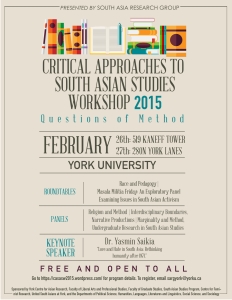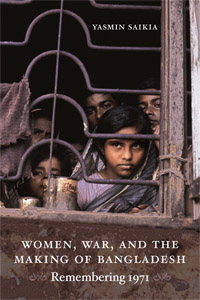Race and Pedagogy – Thursday February 26th, 2:45 – 4:15pm
As academics engaged in research and teaching about racialized bodies, spaces and histories, we often find ourselves located within ‘Area Studies’, ‘Ethnic Studies’ and/or ‘Development Studies’ – disciplines entangled in the racialized politics of knowledge production in the service of the historical and contemporary development of colonialism and imperialism. Even as we aim to challenge the operation of colonial and racial logics in the classroom, these logics continue to mediate how we teach and learn about indigeneity, diaspora, race, migration and multiculturalism. Our fraught relationships with these disciplines inspired us to convene this roundtable to discuss the potentials, limits and challenges of teaching, researching and learning about race and colonialism within the context of the Canadian academy. We envision the roundtable as a space to consider critical connections between area studies, diaspora studies, critical race studies and indigenous studies. We will engage with the following questions:
- What normalized pedagogical practices re-entrench racialized structures of knowledge production? What are the possibilities and limitations of decolonizing epistemology and pedagogy?
- How are pedagogical practices in area studies shaped through race, power and privilege? What other axes of privilege influence research and teaching about ‘other’ places?
- In what ways are ‘other’ places and bodies deployed in conversations about race and settler colonialism in Canada? How can we effectively foreground settler colonial processes in our pedagogies, whether we talk about ‘here’ or ‘there’?
- How can indigenous epistemologies and knowledges inform our teaching, learning and researching about the ‘other’? And vice versa, in what ways can the study of ‘other’ areas help us interrogate society, politics and colonialism in Canada?
- How do racialized educators and scholars working on diaspora negotiate the borders of area studies and disciplines? How can the study of diaspora challenge disciplinary boundaries?
- How do we address issues of translating analytical categories and practices across multiple contexts?
Roundtable panelists:
Cyndy Baskin, Social Work, Ryerson University
Pablo Idahosa, African Studies, Development Studies, Political Science, York University
Aaliya Khan, Communication Studies and Political Science, York University
Nishant Upadhyay, Social and Political Thought, York University
Chair: Omme-Salma Rahemtullah, York University
Masala Militia Friday: An Exploratory Panel Examining Issues in South Asian Activism – Friday February 27th,
3:30 – 5:00pm
Masala Militia will be hosting a unique roundtable that briefly investigates the kaleidoscope of nuance and relevant challenges in regards to south asian activism in the western context.
When we say nuance, we ask, what are the facets of south asian activism? How do you stay true to your self while fighting injustice in the south Asian community? How do you navigate your politics when you are in a traditional conservative desi crowd? Do you flaunt your queerness, or subvert it ninja style?
Our esteemed panelists will speak to their experiences of activism in spatial settings like Toronto, New York, London and Dilli (India). This roundtable will be moderated by Raisa and Nish (Pandora Roxstar) of Masala Militia.
Roundtable Panelists
ASAM AHMAD
Asam Ahmad is a multidisciplinary writer, poet, scholar and community organizer. He has been actively involved in student, queer and social justice movements locally and nationally for the past 10 years. He is a co-founder of the It Gets Fatter Project, a body-positivity project for fat people of color. His writing and poetry have appeared in CounterPunch, Briarpatch magazine, Shameless Magazine, Now Magazine, Black Girl Dangerous and Killing Trayvons: An Anthology of American Violence. He still doesn’t know if he’s desi or what that even means anymore, but is passionate about exploring this question and connecting with other South Asians. He is a tumblr, dim sum and reading addict, and is passionate about making the world a fatter place.
TARA ATLURI
Dr. Tara Atluri-holds a Doctorate of Philosophy in Sociology from York University in Toronto, Canada. She is a Lecturer at Guelph-Humber University and the Ontario College of Art and Design University. Dr. Atluri most recently held the position of post-doctoral researcher working under the supervision of Dr. Engin Isin at the Open University in the United Kingdom, as part of Oecumene: Citizenship After Orientalism, funded by the Social Sciences and Humanities Research Council of Canada. http://www.oecumene.eu/
Recent peer reviewed academic publications include: Atluri, Tara. “Is Torture Part of Your Social Network?” The Žižek Media Studies Reader. Ed. Matthew Flisfeder and Louis Paul Willis. New York: Palgrave Macmillan, 2014. 241-257. “The Young and the Restless: The Delhi gang
rape, “youth,” and precarious feminisms.” Sikh Formations: Religion, Culture, Memory. Special Issue: Violence, Youth, and Memory. Volume 9. Issue 3.M. Nijawin, Duygu Guland Kamal Arora. Taylor and Francis, 2014. 361-379. Atluri, Tara. “The Prerogative of the Brave: Hijras and sexual citizenship after Orientalism. Citizenship Studies, Volume 16, Numbers 5-6, 1 August 2012 , pp. 721-736(16) Atluri, Tara. “Where’s Omar? Where is Justice?” continent. 1.1 (2011): 33-41.Online Journal. http://www.continentcontinent.cc/index.php/continent/article/view/8
Tara Atluri has also worked with various feminists, activists, and arts based organizations transnationally. She most recently performed as part of Cabaret Tolle with Studio 303 in Montreal and has an active artistic praxis that includes performance art, public art installations, and creative writing. Her artistic praxis is often a means of posing political and philosophical questions. http://www.studio303.ca/studio303/en/events/events–
14-15/tolle15/
SHAUNGA TAGORE
Shaunga Tagore is a performance artist, astrologer and community organizer by day, and burlesque superqueero spirit woman by night. She is the co-creator and co-curator of “Unapologetic Burlesque: Queer. Anti-Racist. Consensual. Not Your Average Burlesque.” She is currently developing her first one-woman-show, titled The Erasable Woman, based on a collection of poetry she wrote for her master’s thesis at York University.
KRITTIKA GHOSH
Krittika has been working in the Social Service Sector in both the US and in Canada for the past 15 years. Her extensive work in the South Asian community includes addressing issues such as violence against women, domestic workers rights, post 9/11 hate crimes against South Asians and Muslims, as a program manager in the public health sector managing the first diabetes management project in the Bangladeshi community in New York City. Krittika has worked as a grassroots community organizer, trainer, program manager, board member and advocate for agencies ranging from Sakhi for South Asian Women, Manavi, Workers Awaaz, Andolan, The Asian American Legal Defense and Education Fund, and Council of Agencies Serving South Asians.
Krittika’s expertise on the issue of Violence against Women stems from her extensive work with immigrant communities ranging from direct services, to community engagement, organizing and program management. She is the co-founder of the Shakti Peer Group in New York City. The group is a peer engagement model in response to Violence against Women in South Asian communities.
She is currently a Senior Coordinator of the Violence Against Women’s Project at the Ontario Council of Agencies Serving Immigrants. She has graduated Magna Cum Laude with a Bachelor’s degree in Sociology and Women’s Studies from Simmons, College, Boston, and with a Master’s Degree in Gender Studies from the London School of Economics, UK. She has also been recognized for her work with women and newcomer communities by the City of New York and the Filipino Women’s Network amongst others.
In her free time Krittika is the ultimate Bollywood gossip queen and loves to lose herself in a good novel.

